Fesenjaan
We ended up not going to the park because Dr. Elahi thought it might be too chilly and windy to eat outside, and so they had us over for lunch instead. It was an elaborate affair and we arrived around 12:30 and they brought out snacks and sweets and candy followed by tea and after tea it was more fruit and candy and snacks.
What was interesting was that the whole time, it was Dr. Elahi and Fatemeh who sat with us and chatted, while their other son Sadra was the one serving us and bringing us tea as the Khanum worked in the kitchen. She also came and sat with us but I just thought it was really cool that at least in this family, there is no shame in having the boy do housework and serve people.
Everything was fantastic and I got a picture of the coffee table after we had ravaged its contents for the better part of almost 2 hours. We had to move some stuff off to make room for more stuff and there was just so much that even after we all had some, it all seemed full.
One of the pastries, the one behind the fruit and the pistachios, is called “Sarq e Aroos”, which means bride’s leg. Actually, it means leg of the bride, literally, interesting name for a culture that doesn’t want to draw attention to womanly attributes. Anyway, it’s delicious.

So we sat and chatted for a while longer and finally, lunch was ready. We wanted to help them set the table and get the food out, and I got a quick picture of the table before they all came back out of the kitchen: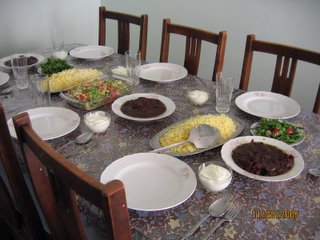
There were two kinds of salads, fried potatoes (which aren’t on the table yet), the black cumin rice, and the dish of honor, fesenjaan. There is nothing I can say to do this dish justice. Even AliBob, not so much a meat eater, loved it. It is something that won’t be found in restaurants, and according to our guidebook, is served to guests of honor... yay that's us!
It takes about 10 hours to make and requires a lot of prep and a lot of cooking, but not a lot of action in between. It consists of walnuts, pomegranate paste and chicken, at the most basic level. The Khanum, being a fantastic cook, has made it unique by adding pistachios, garlic, quince paste (for the sweet content) and maybe some lemon juice. You roughly crush and chop all that up and then let it cook on very very low heat for several hours until the walnuts release their oil.
The taste is sweet and sour, which is the trademark flavor of this dish, but it’s also reminiscent of barbecue sauce but nothing like what we’ve ever tasted before. The rice was fluffy and perfect.
I could eat fesenjaan everyday. It’s up there on my list of favorite foods, right up there with biryani and pulao and all of my mom’s/aunts’/great aunt's/grandmother’s cookings. Needless to say, the women in my family are amazing cooks. I think it’s a generation skipping gene because at 25, I’m still waiting to blossom into my amazing cooking skills.
Anyway. We had a fun lunch and AliBob and I ate our food more like Pakistanis maybe, because we ate our yogurt with our food, whereas they all saved most of their yogurt for after the meal. Interesting. The salad was very good and the dressing was made of mayonnaise (called "sauce-e-mayonnaise").
We were stuffed. Then there was cleanup and we sat and talked for a while longer. Actually… it was well into the afternoon by this point and we figured we should leave. But then we got to talking and watching TV and we were talking about Persian carpets and then the Khanum suggested we could go visit a carpet-weaving factory.
The reason we would be allowed to go is that as a lawyer, she had helped establish this factory with the stipulation that women weavers would be hired, and so the people who owned the factory would be more than willing to let her see how it was progressing.
We got to the factory and though it was closed, the watch man let us in and talked to us about it. It was surprising actually, because it was big and clean and not “factory/sweatshop-y” at all. The looms were all set up on one side, and they were huge. This factory is about to start a new project, which is why the looms were set up with gold thread as the base thread. They are going to weave each page of the Quran as a separate carpet. That should be interesting.
They had worked on a prototype of the border for the pages of the Quran:
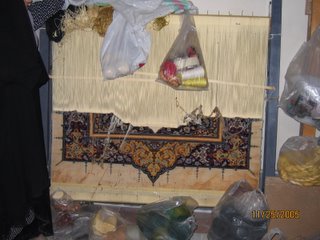
They were also in the middle of weaving a huge rug that had been commissioned by some rich Iranian man who fancied himself a samurai, had married an Italian woman and had a picture of his ancestors (deceased) and his family’s image superimposed onto it.
There are several fascinating things about this picture. First, it’s cool to see the weavers weaving the carpet into the carpet (because they were posed sitting on a carpet). Second, the wife is not wearing a head cover in the picture, but in the carpet, they have woven in a head cover.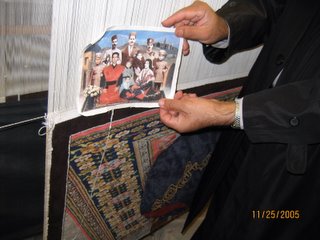
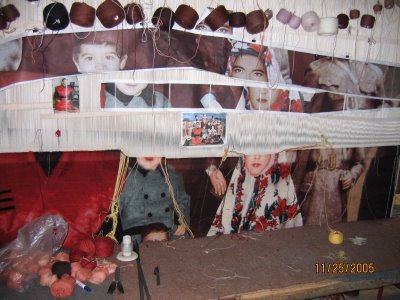
This loom is a rotating loom with a fixed platform, so they work on the carpet on one side and rotate it around. The looms they’ll be weaving the Quran on are not rotating, so they will have movable platforms (kind of like scaffolding) rested on the ladder-type structures on either side and weavers will work on both sides of the loom. Later on, the rug will be cut in half at the top.

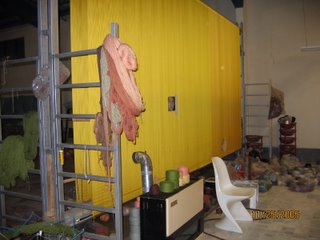
I got a cool picture of the gold and maroon yarns they’ll be using for the Quran too. It was hard to capture the richness and depth of the color:
Anyway, after the factory, we went to a park, Bostan-e-Alawi (Ali’s Park) outside Qom. It was where the Khanum had wanted to have the picnic originally. It was *really* cold, so we did a quick stroll took some pictures and jumped back in the car. Here is the Elahi family and us, thanks to the timer function on my camera, which my cousin Sheherzad and I figured out together. There was some artifact on the lens, and the flash reflected off the stone and that's all that white you see, but there we are.
We took a few more pictures and then we were off on our way to a little zoo type place. It could almost be a petting zoo. They had some interesting animals, including a 3-legged deer and 2 puppies in the same enclosure. The puppies were zoo animals because they don't look like the dogs commonly seen in these parts. They looked like little terriers or bichon frises or something along those lines... little yappy ones.
There were lots of birds and a hawk or a falcon that was beautiful and big but so sad looking in its tiny cage. There wasn’t even a perch for the bird, so it just sat at the edge of its built-in water bowl and stared at us mournfully.
The cages were ill maintained and small and there was no bedding or straw laid down for the animals. There were a bunch of primate cages, and there were a few monkeys that just sat in the corner and stared off into space. There was a horse drawn coach and when they unhitched the horse and put it in its enclosure, we realized how malnourished it was—all ribs and bones jutting out.
The waterfowl (ducks, swans, herons, flamingoes, etc.) were quite beautiful but their ponds were pretty small, freezing cold, and extremely dirty.
We also saw parrots, owls, lovebirds and a couple of ostriches and in Farsi, ostrich is called “shetor-morgh”, which literally means “camel-chicken”. I love it. It makes perfect sense too.
Anyway, we felt bad being too critical since they had brought us here for fun and to take us around to see the sights, but despite the unexpected variety of animals in such a small place in a small town, it was just not a happy place for the animals.
The good thing, though, was that it seemed that the Elahis themselves realized that it wasn’t right to keep the animals this way (Ali-Bob's note: as the extent of the problems of the "zoo" became apparent, I raised the issue of the un-Islamic nature of the treatment of the animals, with which Mrs. Elahi seemed particularly in agreement, and which Dr. Elahi also acknowledged), and as we left, we saw that Mrs. Elahi had stayed behind and when she finally caught up with us at the car, she said she had told the people running the place that they should be ashamed of themselves as people and as Muslims for keeping the animals in such shameful conditions, without even clean water or warm beds or clean cages. Apparently, as Dr. Elahi said affectionately of his wife, she is quite the activist. Very cool.
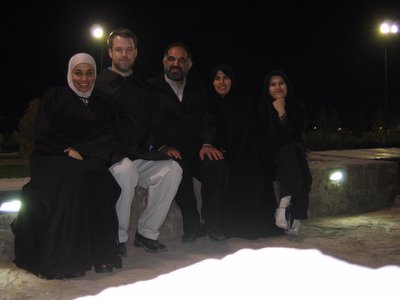

0 Comments:
Post a Comment
<< Home